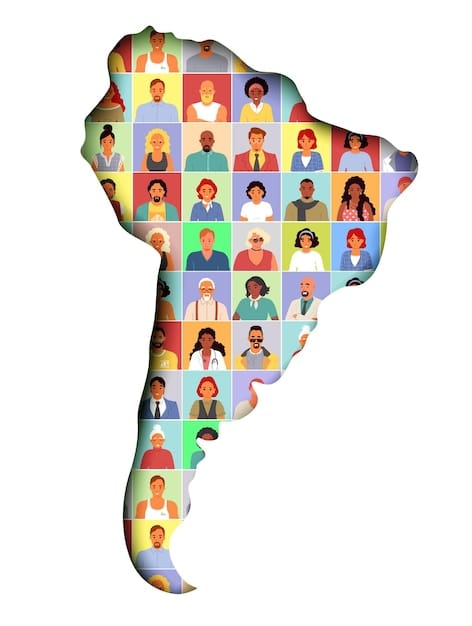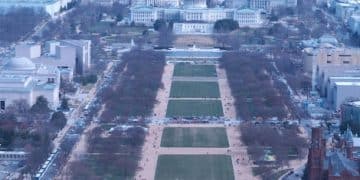Analyzing the Geopolitical Impact of US Sanctions on Venezuela in 2025

Analyzing the Geopolitical Impact of US Sanctions on Venezuela in 2025 involves assessing the multifaceted effects of these sanctions on Venezuela’s political stability, economic conditions, and international relations, offering insights into potential future scenarios and policy implications.
The geopolitical landscape is constantly shifting, and understanding the impact of foreign policy decisions is crucial. This article delves into analyzing the geopolitical impact of US sanctions on Venezuela in 2025, examining the potential consequences for both nations and the wider region.
Understanding the History of US Sanctions on Venezuela
To truly grasp the potential geopolitical impact of US sanctions on Venezuela in 2025, it’s essential to understand their historical context. These sanctions have evolved over time, targeting different sectors and individuals within Venezuela.
Early Sanctions and Their Focus
The initial sanctions were primarily aimed at combating drug trafficking and terrorism, targeting specific individuals and entities associated with these activities. These measures were largely symbolic and had limited overall impact on the Venezuelan economy.
Expansion of Sanctions and Sectoral Impacts
As the political situation in Venezuela deteriorated, the US expanded sanctions to include key sectors of the Venezuelan economy, most notably the oil industry. This had a far more significant impact, severely curtailing Venezuela’s ability to generate revenue.
- Impact on Oil Production: Sanctions restricting access to US markets and technology have dramatically reduced Venezuela’s oil production.
- Economic Consequences: The decline in oil revenue has led to hyperinflation, widespread shortages of essential goods, and a humanitarian crisis.
- Political Instability: The economic hardship has fueled political unrest and increased pressure on the Maduro government.
The history of US sanctions on Venezuela is a complex narrative of escalating pressures and unintended consequences. Understanding this history is crucial for predicting the potential outcomes of continued or modified sanctions in 2025.
The Venezuelan Political Landscape in 2025
The political situation within Venezuela is a critical factor in assessing the impact of US sanctions. Understanding the power dynamics, internal conflicts, and potential for regime change is essential to projecting future scenarios.
Current Political Actors and Their Influence
Several key political actors dominate the Venezuelan political scene, including the ruling socialist party (PSUV), opposition parties, and the military. Each plays a significant role in shaping the country’s future.
Potential for Regime Change and Internal Conflicts
The possibility of regime change remains a significant factor. Internal conflicts and external pressures could contribute to a shift in power, altering the effectiveness and impact of US sanctions.
- Social Unrest: Continued economic hardship could lead to widespread social unrest, weakening the government’s grip on power.
- Military Intervention: The military’s role in supporting or challenging the government remains a key uncertainty.
- Negotiated Transition: International pressure and internal dialogue could lead to a negotiated transition to a more democratic government.
The Venezuelan political landscape is fluid and unpredictable. The actions and decisions of key political actors will ultimately determine the country’s trajectory and the effectiveness of US sanctions.

Economic Impacts of US Sanctions: A Projection for 2025
The economic consequences of US sanctions on Venezuela have been profound, contributing to hyperinflation, shortages, and a decline in living standards. Projecting these impacts into 2025 requires careful analysis of current trends and potential policy changes.
Decline in Oil Production and Revenue
The most direct economic impact of US sanctions has been the sharp decline in Venezuela’s oil production and revenue. This has severely limited the government’s ability to fund social programs and import essential goods.
Humanitarian Crisis and Social Impact
The economic crisis has led to a severe humanitarian crisis, with widespread shortages of food, medicine, and other essential items. This has had a devastating impact on the Venezuelan population.
- Food Insecurity: Millions of Venezuelans face food insecurity and malnutrition due to high prices and limited availability of food.
- Healthcare Crisis: The healthcare system is collapsing, with shortages of essential medicines and equipment.
- Migration and Displacement: Millions of Venezuelans have fled the country in search of better opportunities and living conditions.
The economic impacts of US sanctions on Venezuela are complex and far-reaching. Projecting these impacts into 2025 requires careful consideration of potential policy changes, economic reforms, and humanitarian interventions.
Geopolitical Implications for Latin America
The Venezuelan crisis has broader geopolitical implications for Latin America, affecting regional stability, diplomatic relations, and the balance of power. Analyzing these implications is crucial for understanding the wider impact of US sanctions.
Regional Stability and Migration Flows
The Venezuelan crisis has contributed to regional instability, with millions of Venezuelans migrating to neighboring countries. This has strained resources and created social tensions in host countries.
Diplomatic Relations and Power Dynamics
The crisis has also affected diplomatic relations and power dynamics in the region, with different countries taking different stances on the Venezuelan government and the role of US sanctions.
- Influence of Regional Powers: Countries like Brazil, Colombia, and Mexico have played different roles in addressing the Venezuelan crisis.
- Role of International Organizations: Organizations like the OAS and the UN have sought to mediate the crisis and provide humanitarian assistance.
- Impact on Regional Integration: The crisis has strained regional integration efforts and created divisions among Latin American countries.
The geopolitical implications of the Venezuelan crisis are significant and far-reaching. Addressing these implications requires a coordinated regional approach, with a focus on promoting stability, providing humanitarian assistance, and fostering dialogue.
US Policy Options and Their Potential Outcomes
The US has several policy options regarding Venezuela, each with its own potential outcomes. Understanding these options and their potential consequences is crucial for shaping future US policy.
Continuation of Existing Sanctions
Continuing the existing sanctions regime could maintain pressure on the Maduro government but also exacerbate the economic and humanitarian crisis. This approach carries the risk of further destabilizing the country and increasing regional tensions.
Easing or Lifting Sanctions
Easing or lifting sanctions could provide some economic relief to Venezuela but also potentially strengthen the Maduro government. This approach carries the risk of legitimizing the current regime and undermining efforts to promote democracy.
- Conditions for Sanctions Relief: The US could set conditions for sanctions relief, such as democratic reforms or the release of political prisoners.
- Phased Approach: A phased approach to sanctions relief could allow the US to gradually ease restrictions while monitoring progress on key issues.
- Targeted Assistance: The US could provide targeted assistance to the Venezuelan people, focusing on humanitarian aid and support for civil society.
The choice of US policy options regarding Venezuela is complex and consequential. A careful balancing of competing interests and potential outcomes is essential for shaping a strategy that promotes stability, democracy, and human rights.

Alternative Scenarios and Long-Term Projections
Several alternative scenarios could unfold in Venezuela in the coming years, each with its own set of potential outcomes. Developing long-term projections requires consideration of these different possibilities.
Scenario 1: Continued Authoritarian Rule
In this scenario, the Maduro government remains in power, despite continued economic hardship and international pressure. Sanctions remain in place, and the humanitarian crisis deepens.
Scenario 2: Negotiated Transition to Democracy
In this scenario, a negotiated transition to democracy takes place, leading to free and fair elections. Sanctions are gradually lifted, and international assistance helps to rebuild the Venezuelan economy.
- Role of International Mediation: International actors play a key role in facilitating dialogue and negotiating a transition agreement.
- Economic Reforms: A new government implements economic reforms to address hyperinflation, attract foreign investment, and promote sustainable growth.
- Reconciliation and Justice: Efforts are made to promote reconciliation and justice, addressing past human rights abuses and ensuring accountability.
The future of Venezuela is uncertain, but careful analysis of potential scenarios and long-term projections can help policymakers and stakeholders to prepare for different outcomes and shape a more positive future for the country.
Conclusion: Navigating the Complexities of US-Venezuela Relations in 2025
Analyzing the potential geopolitical impact of US sanctions on Venezuela in 2025 reveals a complex interplay of political, economic, and social factors. Understanding the historical context, current political dynamics, and potential policy options is crucial for navigating this challenging landscape and promoting a more stable and prosperous future for both nations.
| Key Point | Brief Description |
|---|---|
| 📉 Economic Decline | US sanctions significantly reduced Venezuela’s oil production and revenue. |
| ⚠️ Humanitarian Crisis | Shortages of food, medicine, and essential goods lead to widespread suffering. |
| 🌍 Regional Impact | Venezuelan crisis affects regional stability and diplomatic relations. |
| 🏛️ Political Instability | Continued internal conflicts and the potential for regime change. |
FAQ
▼
The primary sanctions target Venezuela’s oil sector, restricting access to US markets and technology; and also sanctions against key Venezuelan officials for corruption and human rights abuses.
▼
US sanctions have significantly impaired Venezuela’s oil production and exports. The decline in oil revenues has resulted in hyperinflation, shortages of essential goods, and a severe economic crisis.
▼
Sanctions have exacerbated Venezuela’s humanitarian crisis. Millions face food and medicine shortages, leading to malnutrition and increased mortality rates, particularly among vulnerable populations.
▼
Sanctions have increased pressure on the Maduro government. They have fueled internal political divisions and strengthened the opposition, while also providing the government with a narrative of external aggression.
▼
Possible scenarios include continued authoritarian rule, a negotiated transition to democracy, or further political and economic collapse. Each scenario presents different implications for the region and US policy.
Conclusion
In conclusion, understanding the complex interplay of factors shaping US-Venezuela relations is crucial for navigating the geopolitical landscape. The future impact of sanctions will depend on a variety of factors, including political dynamics within Venezuela, regional developments, and the evolving nature of US foreign policy.





